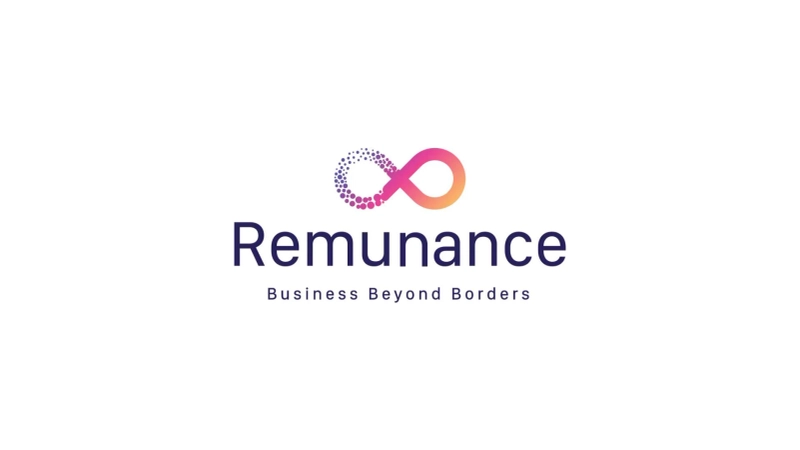Table of Contents
Today, operating a business in a foreign country isn’t necessarily a cost-intensive and time-consuming process. With the globalized economies and availability of advanced technologies, a foreign company can easily access global talent and hire remotely from multiple countries or a target location at reduced costs.
Before the COVID-19 pandemic, only a few players could take advantage by relying on international employees as a key workforce. The pandemic has brought a drastic change in the ideas and practices of international employment. Irrespective of how big or small, every business adopted cost-cutting measures to stay afloat in the cut-throat global market. One significant transformation that the pandemic brought in the business world was the rising acceptance of remote work setups.
With the increasing adoption of remote work across industries, it is believed by analysts that the remote work culture will stay relevant in the coming years. As Forbes mentioned, many companies would prefer working remotely, or at least in a hybrid mode to align with their employees’ preferences for work design. Also, one major development seen during the pandemic is the increasing remote hiring by small & medium enterprises (SMEs) for their business operations. It’s safe to say that the pandemic has a major role in accelerating the practice of hiring remote workforce for business needs.
Now, you may ask, “Is that easy to assemble a remote team and start operations quickly in another country?” The answer is “yes” if you know the market thoroughly and have all the necessary support to ensure a successful business operation. However, not every business has the same answer.
We’d say that hiring international employees today is relatively easy compared to a few decades ago. Technological advancements, favorable government initiatives, and rapidly evolving business ecosystems have helped ease international hiring. But, hiring remote professionals and employing them today still have several complications and challenges.
One major challenge of international hiring is businesses must ensure compliance with the existing employment regulations in that foreign jurisdiction. Setting foot in a foreign market requires adherence to various legal and compliance norms. It becomes more complex if a business aims at hiring remote talent from multiple countries as employment regulations differ significantly from one country to another.
This is where employer of record (EOR) services come into the picture and play a crucial role in your team expansion and operation strategy. EOR, as an expert service provider, offers compliance assurance and support to allow smooth hiring and seamless operations in the remote local market. It means that EORs enable a company to set foot in a foreign jurisdiction with zero complications.
For instance, EORs help Western companies hire the best professionals globally and employ them remotely in compliance with the employment laws of that specific country. This facilitates easy team expansion and smooth operations in a foreign country. The best part of employer of record (EOR) services for Western businesses is that the services play a crucial role in filling talent gaps and shrinking talent availability in the West. Talent deficit is currently a major threat in the Western corporate world.
Things you’ll learn from this blog
In this blog, we’ve explained every major aspect and fundamental of employer of record (EOR) services. It consists of 13 key areas, covering the meaning, evolution, benefits, and challenges of EOR services. Moreover, you can learn the difference between an employer of record (EOR) and other competitive business models helping you build a successful remote team in a foreign country.
Also, the blog has a detailed approach and study to showcase how India is a major destination for team building and operation expansion. It explains why EOR is essential in Indian expansion, the cost of using EOR services in India, and how to select the best Indian EOR service providers. Last but not least, the blog explains why Remunance can be your EOR partner in your Indian team-building journey. Let’s begin exploring EOR services and key aspects of EOR services.
Employer of Record (EOR) Meaning
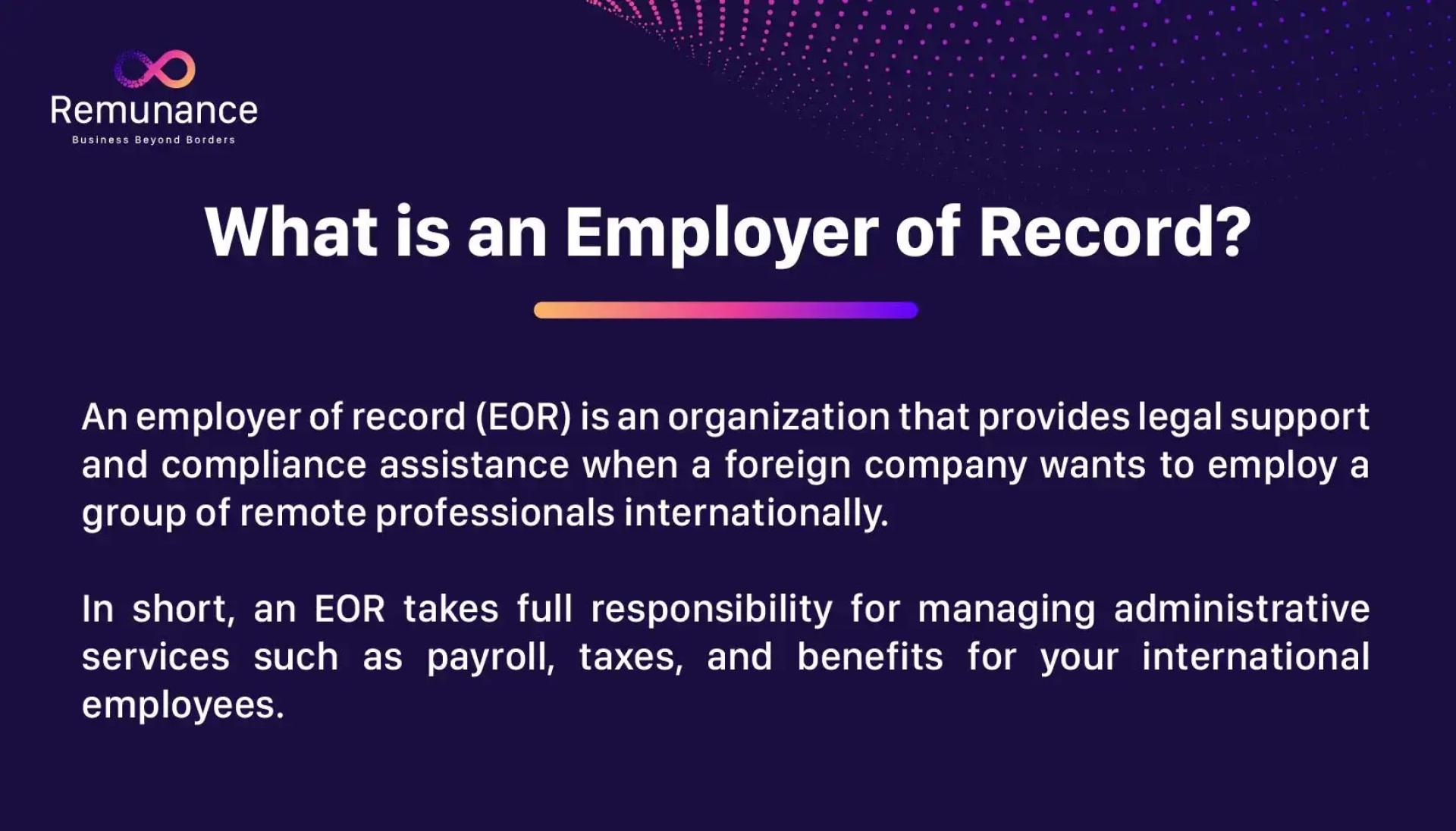
An employer of record (EOR) is an organization that provides legal support and compliance assistance when a foreign company wants to employ a group of remote professionals internationally. Entering a new market, a foreign company often faces challenges in navigating a complex set of employment regulations. EOR makes it easy for foreign businesses.
In addition to compliance support, an EOR takes full responsibility for managing administrative services such as payroll, taxes, and benefits for your international employees. It means an employer of record provides an all-in-one service package that helps you hire international employees compliantly and get your human resource (HR) services done on your behalf.
In short, an employer of record (EOR) is an organization that legally employs a team of local professionals on behalf of foreign businesses. Thus, EOR acts as the local guardian of employees who work for a foreign company. On the record, it’s an employer of the local employees and handles all legal and administrative responsibilities related to the employees. Simply put, with EOR support, a foreign business can easily hire a team of remote talent in another country and employ them successfully.
Evolution of Employer of Record (EOR) as a Business Model
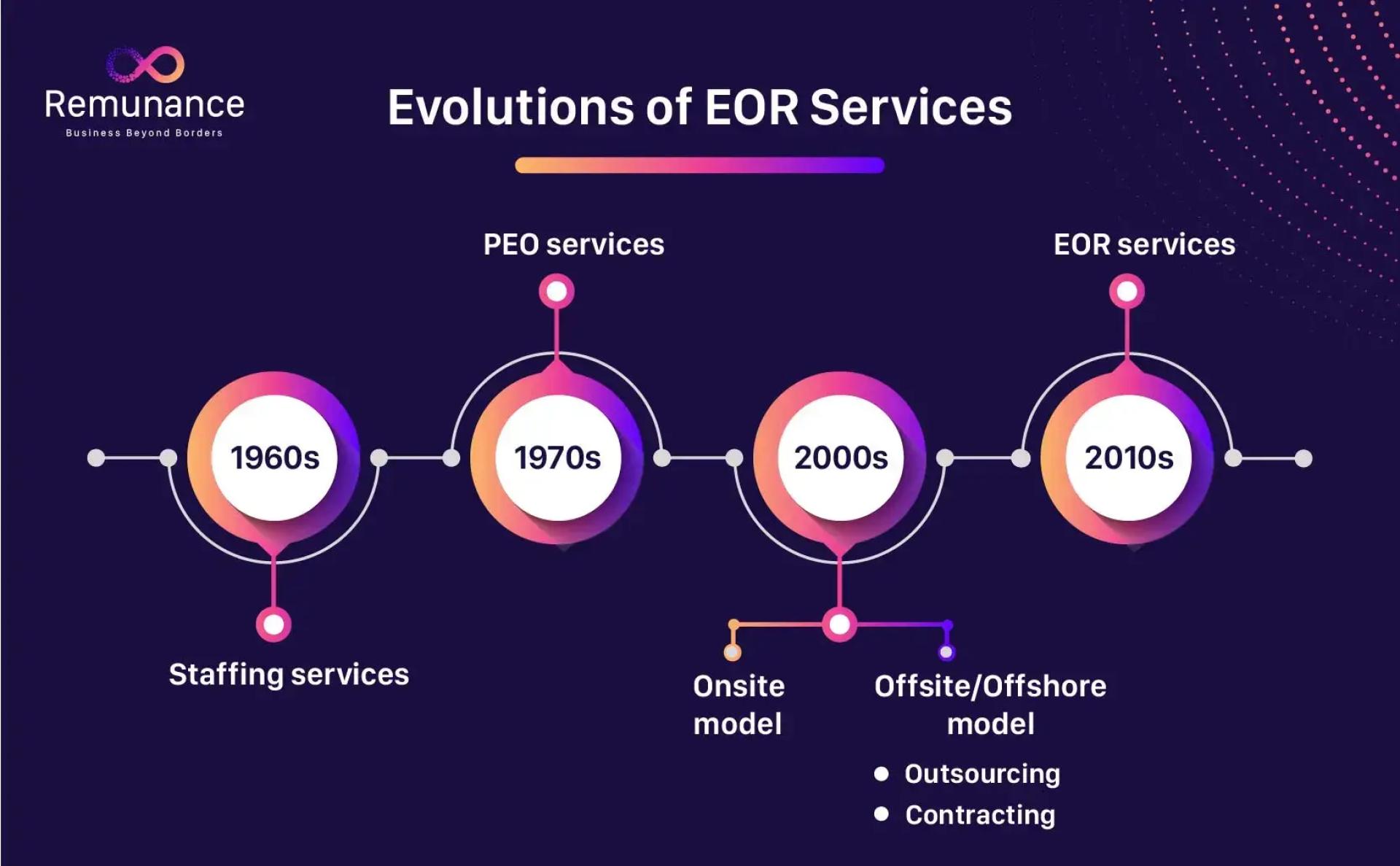
Employer of record (EOR) emerged as one of the most refined business models in the evolution of employment arrangements. Till today, EOR is the most economical employment arrangement model that has transformed the ideas and practices of international recruitment. The birth of EOR as a business model resulted from the interconnected world, characterized by a globalized economy and technological advancement.
The rise of staffing services in the 1960s drastically changed the traditional employment processes and became popular in the West. Hiring third-party agencies specialized in recruitment was a profound transformation. Businesses learned they could save time and energy by relying on an expert service.
In the early 1970s, the world witnessed a rapid proliferation of third-party expert agencies. A professional employer organization (PEO) emerged as a new business model in the United States that provided expertise in HR services. With the advent of PEO services, many small companies could easily manage their employees’ administrative functions without keeping an in-house HR team. Partnering with PEO services proved more cost-effective than keeping an in-house HR team.
With the wide prevalence of a globalized economy in the 2000s, global companies started looking for various opportunities beyond their home countries. Initially, many skilled professionals were brought back to the West from different parts of the world and were employed onsite. However, one major challenge of the onsite model was that, in the long run, it wouldn’t be cost-sustainable for businesses employing international workers in their home countries.
In search of cost-effective alternatives, businesses in the West now wanted talent who could work from their own countries rather than bringing them to the West. The rising demand for offsite or offshore business engagements has laid the foundation for outsourcing as a business model. With the increasing popularity of remote work setups, businesses started hiring contractors abroad for short-term projects.
However, hiring outsourcing services and contractors was associated with challenges such as the lack of flexibility and issues with legal compliance. These problems demanded a solution, resulting in the rise of employer of record (EOR) as a robust business model.
Employer of Record (EOR) Evolution: A Case Study of India
India presents a good example of how the globalized economy and the interconnected world have transformed international employment, leading to the wide acceptance of Employer of Record (EOR) services. With the rising popularity of the offshore model, developing economies such as India and China became key destinations for a range of outsourcing and contracting services.
Global businesses started outsourcing HR services in India mainly due to the availability of skilled talents and cost-efficiency services compared to the West. Due to certain challenges associated with outsourcing, many companies prefer hiring Indian contractors. Although hiring contractors has certain advantages such as better control for businesses, easy to downsize or upsize workforce, and cost-saving; it has several shortcomings too.
employer of record (EOR) services emerged as a solution to various problems associated with outsourcing and contracting. With EOR service support, a foreign company can easily navigate the legal complexities when entering the Indian market and operate compliantly, with better control over employees and reduced costs.
Benefits of an Employer of Record (EOR)
Employer of Record (EOR) services offer several benefits, including compliance support, risk mitigation, access to global talent, operational efficiency, and cost savings. As global businesses increasingly compete to tap skillful resources internationally, an EOR provides diverse benefits for small and large companies. Let’s explore the major benefits of using EOR services for businesses.
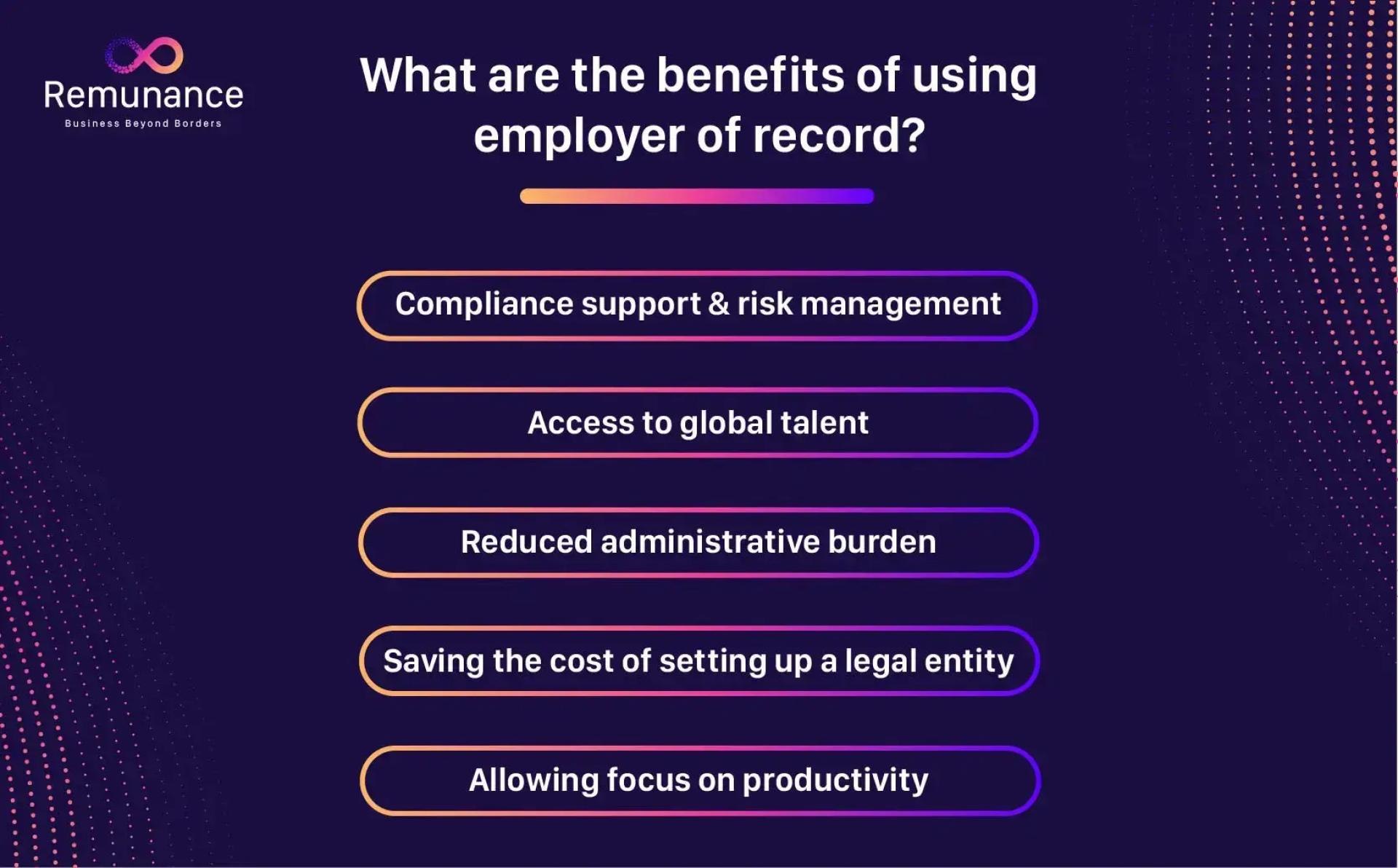
Compliance Support & Risk Management
employer of record (EOR) services offer compliance support for companies expanding their business operation internationally. When using EOR services, foreign companies can enter a new market and operate their business without worrying about compliance issues. Being a legal employer, EOR companies mitigate compliance risks by shielding your business from potential tax liabilities, legal disputes, and non-compliant activities.
Access to Global Talent
EOR services allow companies to access a diverse talent pool without establishing a legal entity in a different target country. Companies can hire skilled professionals quickly and compliantly regardless of geographical barriers with employer of record (EOR) support. Small companies can compete globally by accessing specialized skills readily unavailable locally. Accessing and leveraging a global talent pool is key to staying competitive in a rapidly evolving global marketplace.
Reduced Administrative Burden
EORs help reduce the administrative burden of businesses as your EOR partner is solely responsible for handling HR services related to your international employees. On your behalf, EOR companies handle payroll, tax filing, and benefits administration, freeing up your valuable time and enabling you to focus on your core business tasks. Also, employer of record (EOR) services help improve the overall employee experience and productivity.
Saving the Cost of Setting Up a Legal Entity
Due to the unique nature of the EOR model, a global enterprise can work with dedicated full-time employees and operate its business without establishing a legal entity in the target country. Using EOR services saves businesses from spending hefty sums and making the upfront capital investment required for setting up a legal entity in a foreign country. It’s a major EOR benefit for small & medium enterprises (SMEs) aiming to set foot in a new market with minimal investment.
Know More: What Are the Employer of Record Benefits for Small Businesses?
What are the Services Provided by the Employer of Record (EOR)?
EORs provide a range of services related to legal, financial, and HR functions. By using employer of record services, a business can get the advantages of compliance support, payroll processing, benefits administration, and local tax filing. Let’s explain each solution provided by the employer of record.
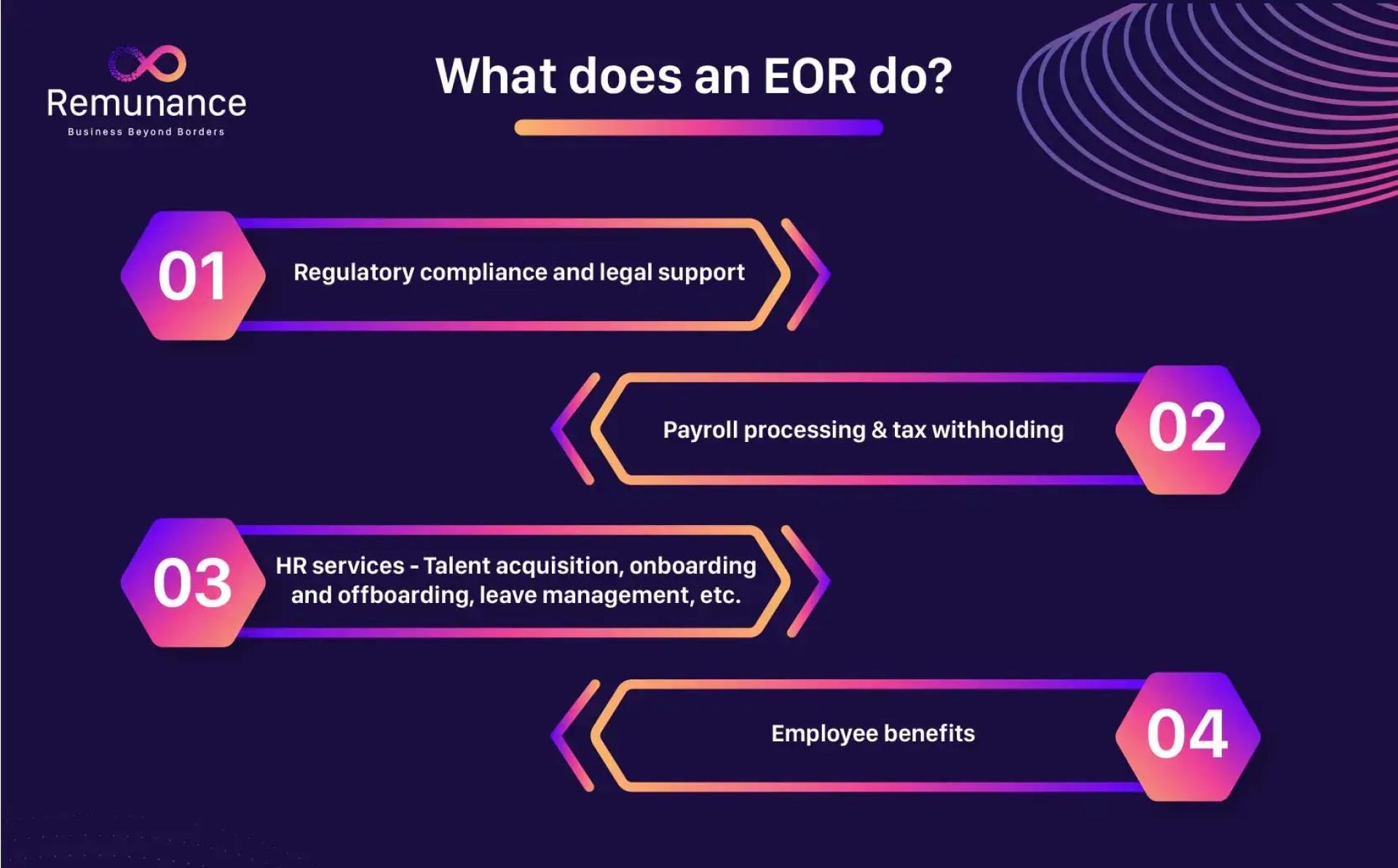
Regulatory Compliance and Legal Support
EORs are legal experts who stay abreast of local labor laws and regulations to ensure that all employment practices and parties involved comply with legal requirements. While expanding in a foreign jurisdiction, businesses must comply with various legal requirements—minimum wage, employment benefits, working hours, overtime rules, and workplace safety standards set by the government. With employer of record (EOR) legal support, businesses can handle all of the above as per the existing laws of the particular country, protecting both employees and their companies.
Payroll Processing & Tax Withholding
EORs handles payroll processing and tax withholding of the employees to ensure compliance with the existing tax regulations. Payroll processing includes calculating monthly salary, deducting taxes, paying towards benefits, and ensuring timely payments. Calculating employee salary includes deduction of any applicable taxes such as social security contributions and other mandated deductions in the case of India, such as benefits deduction like employees provident fund (EPF). On top of tax withholding from employees’ paychecks, EOR companies remit taxes and file tax reports to relevant authorities.
HR Services
EORs provides diverse HR services such as talent acquisition, onboarding and offboarding, training and development, and performance management.
- Talent Acquisition: Most EORs assist in finding the right talent that fits the job requirements of the client companies. As per the client company’s requirements, EORs prepare the hiring processes ranging from job posting, candidate screening, and conducting interviews. Once potential candidates are shortlisted, the client company conducts direct interviews virtually and finalizes the candidates.
- Onboarding and offboarding: Once candidates are finalized, EOR partners handle the onboarding process for new hires, such as contract paperwork and documentation completion, orientation sessions, and device handover. Similarly, they take care of offboarding tasks like exit interviews, full and final payments, and returning company assets when employees leave a company.
- Leave and attendance management: Not all EOR employees have the same leave structures as different companies have different leave policies. EORs manage leave and attendance and maintain a record for every EOR employee. Whenever employees face any issues or discrepancies in their leave structures, the employer of record (EOR) handles them. Also, leave management eases leave encashment when an employee leaves.
Employee Benefits
EORs handle benefits administration of employees, including medical leaves and claims, health insurance, retirement funds, gratuity, maternity leaves, and paid leaves. As employee benefits differ from one organization to another and country to country, EOR services offer tailored employee benefits to match the employee-employer needs. For instance, some popular and legal employee benefits in the US such as unemployment insurance, paid family leaves, and dental insurance are not widely practiced in countries like India.
However, EOR companies offer customized benefits administration for employees as per the requirements of client companies. As long as it is under the preview of the local laws and regulations, client companies can provide customized benefits services to their employees.
The services mentioned above are keys to a smooth and successful international expansion. They are the support systems for hiring and employing international professionals compliantly and expanding business successfully. However, employer of record (EOR) is one of many services available for global expansion. Let’s explore the other business models you can use for international expansion.
EOR Comparison with Different Business Models
EOR service is one of the four major models you can use for business expansion internationally. The other three popular business models—professional employer organization (PEO), outsourcing, and subsidiary formation. All these business models have certain similarities and differences. One key similar aspect is that these are the key models through which a company can build a team in an international market.
Each business model has unique advantages and challenges. However, choosing the best model depends on your business needs and goals. Here, we’ll discuss how EOR compares with other models.
Employer of Record (EOR) vs. PEO: What’s the Difference?
Employer of record and PEO are two popular models or services businesses often use as employment partners when hiring international employees. Both models offer similar HR services, such as payroll processing, tax deductions, and benefits administration. But, the responsibilities and work arrangements are significantly different between the two models. Let’s understand three differences in EOR vs PEO:
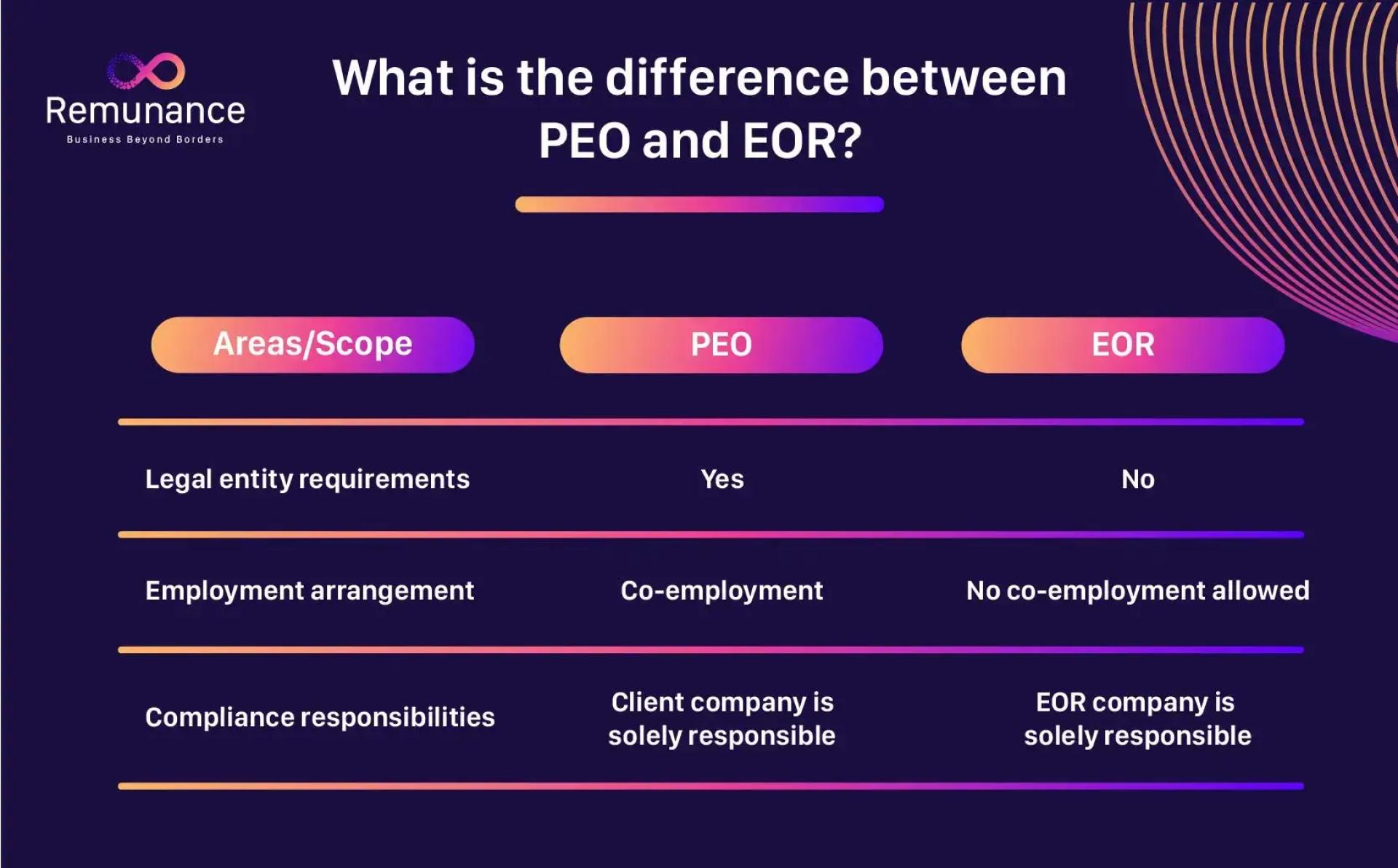
- To avail PEO services, a client company must have a legal entity in the country where your PEO partner is located. On the other hand, a company can use EOR services without establishing a legal entity in the target country.
- In PEO services, the client company enters a co-employment arrangement, a contractual partnership to share employment obligations with the PEO partner. On the contrary, EOR companies are solely responsible for handling all administrative work of employees, leaving the client company to focus on their core business functions.
- In the PEO model, the client company is responsible for handling the regulatory compliance related to employment. Whereas, EORs take full responsibility for handling legal complexities and are solely responsible for any compliance issues related to the employment.
Know More: PEO vs EOR vs International PEO: What’s the Difference?
5 Reasons to Choose EOR Over Outsourcing
Outsourcing is one of the most popular services for getting work done remotely. Businesses often use outsourcing services mainly due to two key reasons: cost-effectiveness and subject-matter knowledge. However, EOR is a better option than outsourcing in various areas, including ensuring transparency, employee retention, and better control for businesses over their international employees. Let’s briefly explore some key advantages of EOR over outsourcing for foreign companies.
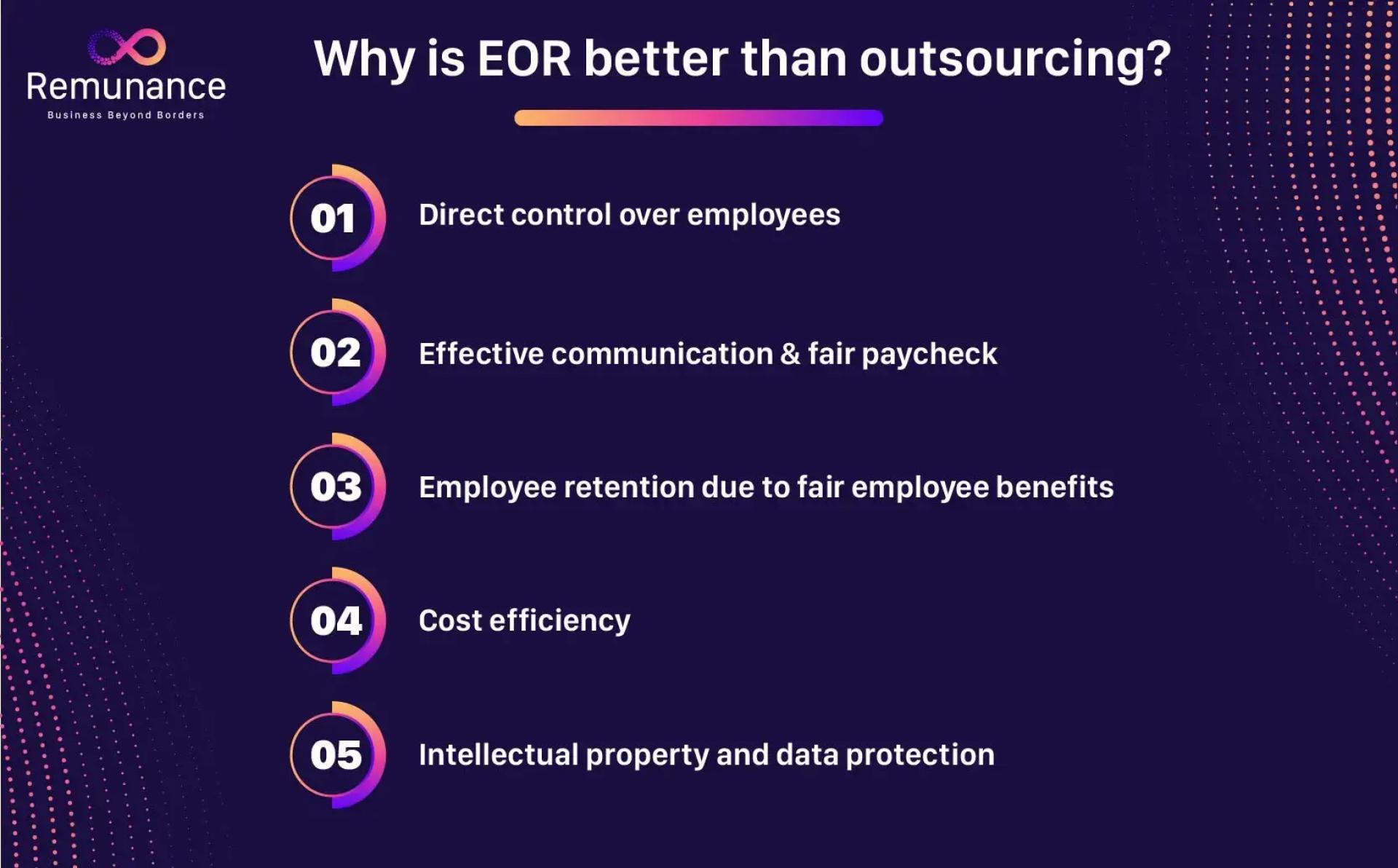
Direct Control Over Employees
Unlike outsourcing, EOR partner allows client companies direct control and collaboration with employees. In the outsourcing model, the outsourcing company hires a team that will work for their client companies and act as a mediator between the employers and employees. In the EOR model, client companies conduct direct interviews and select the team of their choice. Due to the absence of an employee performance/delivery mediator in the EOR model, the client companies can directly communicate with the employees.
Effective Communication & Fair Paycheck
EORs have a fair practice when deciding employees’ paychecks. It’s because of the direct communication between the employers and employees. In the outsourcing model, the client companies can’t decide the employees’ paychecks as the companies normally don’t participate in team selection. It’s the outsourcing companies that finalize the payment structure of the outsourced employees. Hence, when working with outsourcing agencies businesses may face issues related to unfair paychecks to employees.
Employee Retention Due to Fair Employee Benefits
Compared to outsourcing, EORs offer a high chance of employee retention. EOR employees are entitled to fair employee benefits, including medical claims & leaves, insurance benefits, paid leaves, retirement plans, and more. Due to more transparency and openness in the employer-employee relationship, EOR employees mostly receive the best employee benefits which can also be decided in collaboration with the client company, leading to job satisfaction and security.
Low Cost and Transparency in Service Charge
Outsourcing companies mostly charge fees on a time and deliverable basis. This often results in a bundled rate due to the hourly charge rate or per-person services. On the other hand, EORs offer transparent and fixed service fees.
Intellectual Property and Data Protection
Intellectual property (IP) protection remains a core concern for businesses, especially startups and SMEs. In the outsourcing model, some individuals in the outsourcing team may work on similar projects for multiple clients simultaneously, leading to IP risks. On the other hand, EORs ensure the IP rights protection of businesses by allocating separate EOR teams for each client. For example, EOR companies in India must comply with the General Data Protection Regulations (GDPR) when dealing with clients and customers from European Union (EU) countries.
When to Choose Employer of Record (EOR) Over a Subsidiary Company?
Under certain circumstances, using EOR services makes more sense than forming a subsidiary company. One obvious reason is cost efficiency, which drives the rising demand for EOR services. Let’s explore when businesses, especially SMEs should use EOR services rather than setting up a subsidiary company.
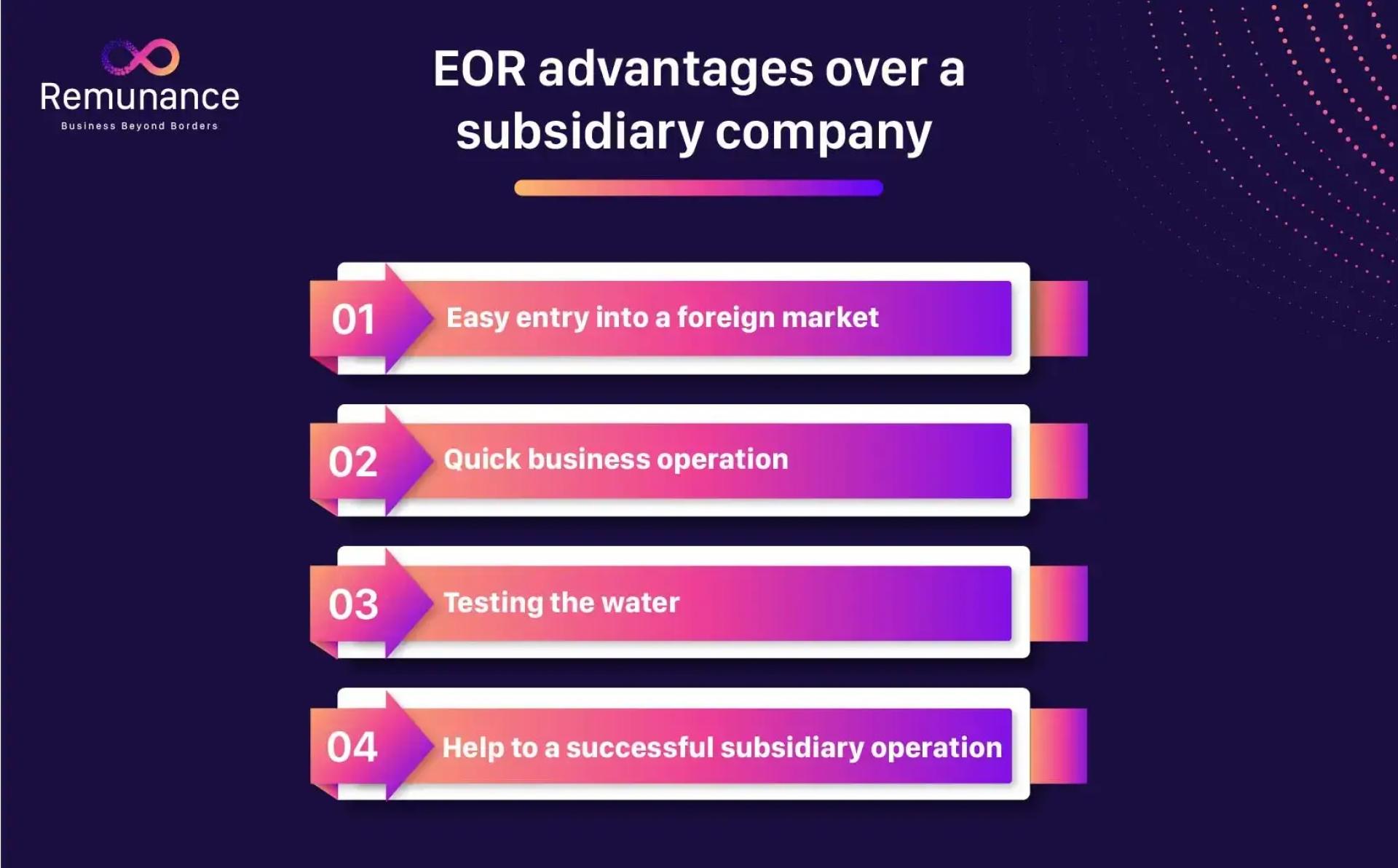
Easy Entry into a Foreign Market
Opting for EOR services is better than a subsidiary company when global companies wish to enter a foreign market easily and compliantly. EOR companies have a deep knowledge of the local market and well-established infrastructure. Using such facilities, a global company can easily set foot in a foreign market without worrying about compliance issues and spending upfront capital. Forming a subsidiary company normally takes a much longer time as compared to EOR services. For instance, subsidiary formation and making it operational to onboard resources can take nearly 3-4 months in India.
Low-Cost Investment and Operations
Partnering with EORs is the best option if you’re looking for low-cost investment and operations in a foreign market. With your EOR partner, you can easily build a team and operate your business without establishing a subsidiary company in the target market. Setting up a legal entity in a foreign country generally needs substantial upfront capital, which is approximately 4.5 times costlier than EOR services.
Quick Business Operation
EOR services are more suitable when companies want quick business operations in a foreign market. With EOR infrastructure support and networks, a foreign company can quickly operate in a new market within a few days. It takes around 2-3 days to start a business operation in India through EOR services if the company already has some resources and has decided on its office location. Or else, you can form a new team with EOR recruitment support and start your operation.
Testing the Water
Choosing EOR services is a better option for experimenting and testing the ecosystem of the new territory. The key reason is that one can’t predict the actual actions and consequences when planning for international expansion. With minimal risk and investment in the EOR model, companies can temporarily assemble a remote team in the target country and test the team without making long-term commitments. If the market is unsuitable for your business, you can easily dissolve the team and exit the market with minimal complications.
A Successful Subsidiary Operation
Opting for EOR services is an ideal foundation for a successful subsidiary operation. This is one of the key benefits of EOR services for large companies looking for an effective operation after setting up a subsidiary company. Through working with EORs, foreign companies can learn more about the local culture, work culture, employees’ work expectations, compliance requirements in the region, and customer behavior of the target markets.
Know More: Employer of Record: To Simplify Subsidiary Formation in India
Employer of Record (EOR): Not a Service That Fits All
Although employer of record services offer various advantages compared to other business models, it’s not a service that fits every business circumstance. In some contexts, choosing other models, such as outsourcing, hiring independent contractors, and forming a subsidiary company can be more meaningful. Let’s explore those business circumstances under which EOR is not a suitable service model.
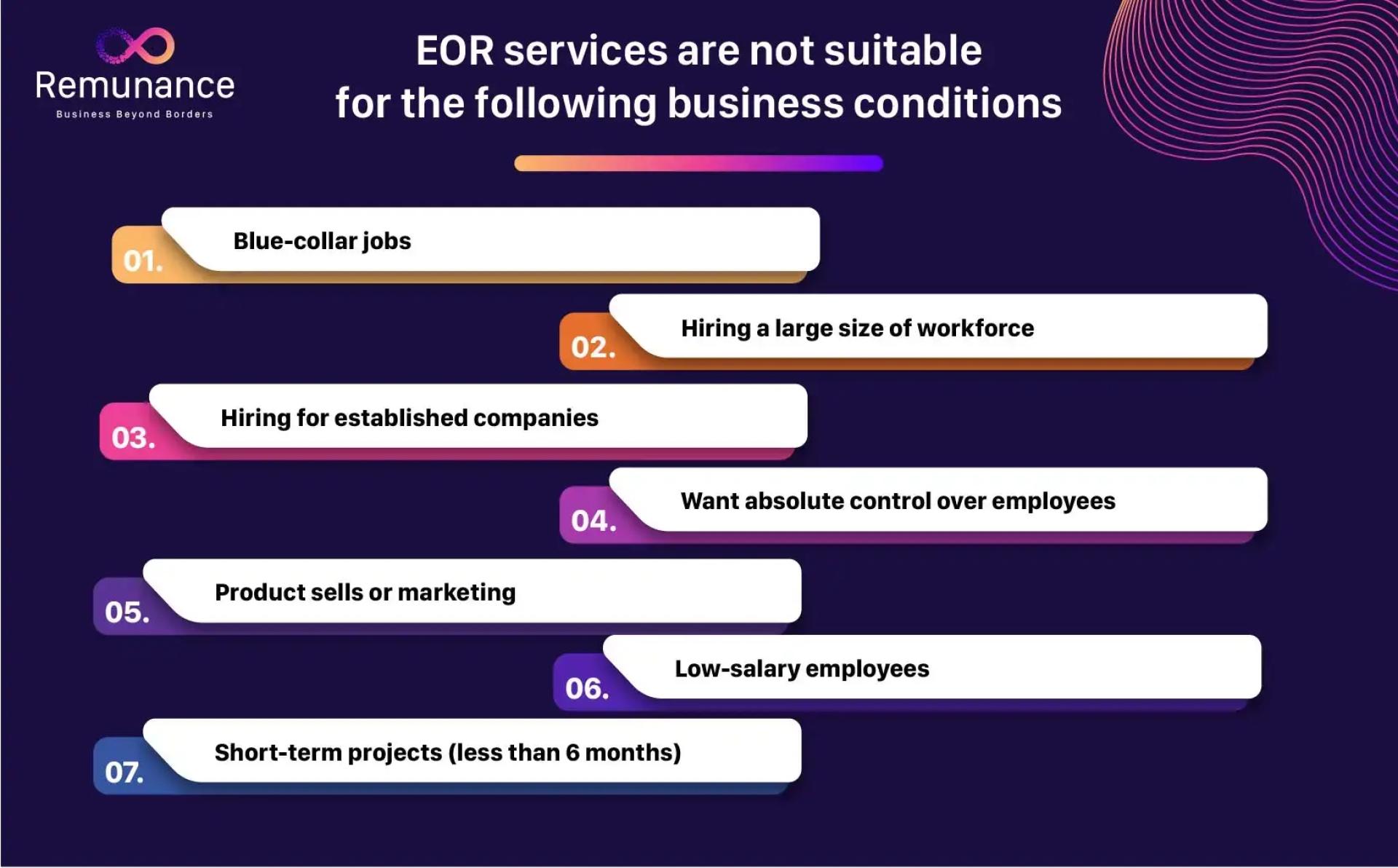
Looking for blue-collar workers or manufacturing: If you’re looking to hire blue-collar workers or manual laborers, EOR services can’t help. Also, EOR services aren’t suitable for manufacturing.
Focusing on marketing or product sales: EORs aren’t a suitable service for your product promotion or sales. If your focus is product sales or marketing, opening a sales branch, or incorporating a subsidiary company in the target market is more suitable. Yet, there is an exception to this. If you want to sell your products by building a sales department in India using EOR, the invoice will be in your company’s name. Also, you must pay 18% goods & services tax (GST) to your Indian EOR partner.
Hiring a large remote workforce: If you’re looking to expand your business rapidly in the target market by hiring a large number of remote professionals, EOR is not a good option. EOR service cost will be significantly higher when you add more employees, say more than 45 employees. At certain points, keeping many employees under the EOR payroll can be costly; forming a subsidiary company would make more sense.
Hiring by large companies with established brands: Using EOR services may not be a good option for established brands as they can easily hire employees without EOR assistance. However, it depends on which team these brands are hiring for.
Looking for absolute control over employees: In the EOR model, some authorities are delegated to the EOR service providers so that they can execute the HR administrative functions of employees on your behalf. Forming a subsidiary company makes sense if you want absolute control of your employee administration and performance.
Having a team with a low-salary bucket: In the EOR model, businesses must provide certain mandatory and statutory benefits for their employees to comply with employment regulations. Using EOR services can be a less cost-effective solution for a team with low-salary packages.
Need services for short-term projects: Hiring contractors or freelancers would make more sense for short-term projects. In the EOR model, you must provide employee benefits, which isn’t suitable for short-term projects. Also, depending on the complexity of the job designation, hiring EOR employees may take time, say at least a few weeks or months.
These are some business situations where EOR services don’t rightly fit in. If your requirements don’t fall into those business circumstances mentioned above, using EORs is the best option. Once you completely understand the advantages and disadvantages of EOR services, let’s understand how to choose the best EOR service provider. Before choosing your EOR partner, however, you must set your priorities—target market(s), business strategies, and, most importantly, business goals.
How to Select an Employer of Record (EOR) Partner
Choosing the right service provider is not straightforward as it depends on various factors—type of industry, business size, business nature, and business goals & objectives. Irrespective of your business size or nature; however, it’s imperative for every business to consider the following five criteria when selecting the right EOR service provider.
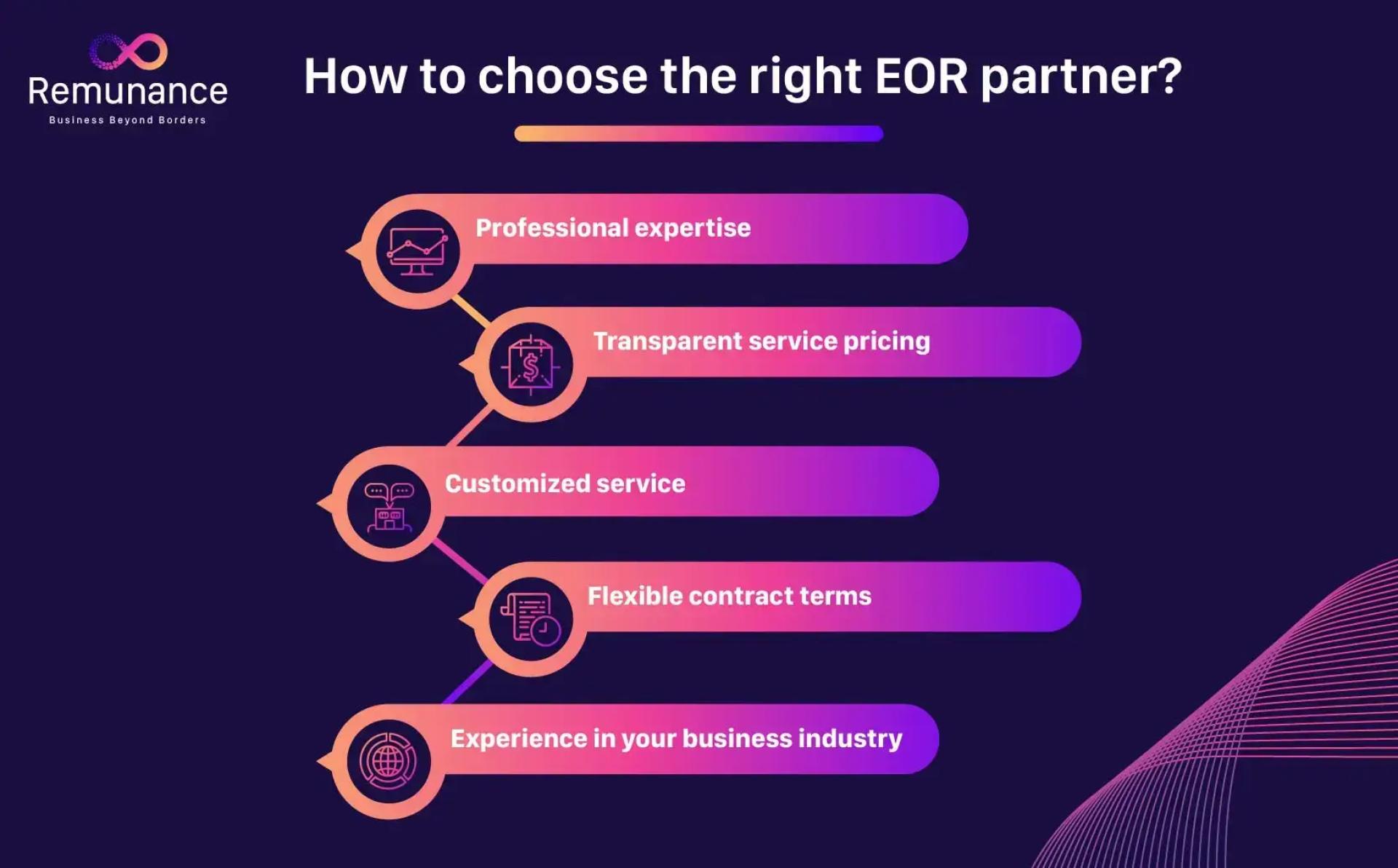
Professional Expertise
You must look for an EOR partner with a good track record of professional expertise in providing compliance assurance and handling various employment-related functions. Check case studies, client testimonials, and company certifications, and also get referrals & references from previous clients.
Transparent Service Pricing
Choose an employer of record (EOR) service provider that offers an upfront service price to avoid unexpected costs and budget overruns. Transparency in pricing means a clear pricing structure without hidden fees. Compare price offers of different service providers and select the best one that comes under your budget.
Customized Service
Different businesses have unique needs due to their varied sizes, work nature, and strategies. Choose an EOR partner offering tailored services and solutions to your specific needs. Also, your EOR partner must charge only for the services you use, which can reduce your budget burden.
Flexible Contract Terms
Flexibility in contract terms is an important criterion you must consider when choosing an EOR service provider. Business needs change from time to time due to the changing market conditions. You must look for an EOR partner that offers flexible contract terms to easily swift one service to another and allow you to terminate the agreement with good reasons.
Experience in Your Business Industry
If your business is based on niche markets, you must look for EOR services with experience handling clients in such specific markets or industries. Also, ask for references and case studies of clients working in a similar market or industry to validate the expertise of EOR service providers.
You can include other criteria to expand your research that help you choose the best EOR service providers. However, you must consider these five criteria when examining the knowledge and experience of your potential employer of record (EOR) partners. Ultimately, your EOR partner must fulfill your immediate needs and support for a successful operation.
Know More: How to Choose the Right Employer of Record (EOR)?
Why Do You Need EOR for Business Operations in India?
India has emerged as one of the most attractive countries when looking for the right destination for global expansion. There are multiple reasons why businesses find India a promising destination for business operations. The availability of a skilled workforce, cost-effective operation, government support, thriving startup ecosystem, growing market potential, and stable political environment are major reasons for eyeing India as a key destination.
However, entering the Indian market without a local guide or expert can be daunting and risky due to legal complexities, cultural differences, work culture differences, and more. This is where the employer of record (EOR) services come to your assistance as a local guide in the Indian market. Let’s see how EOR helps you access numerous advantages and expand business operations in India.
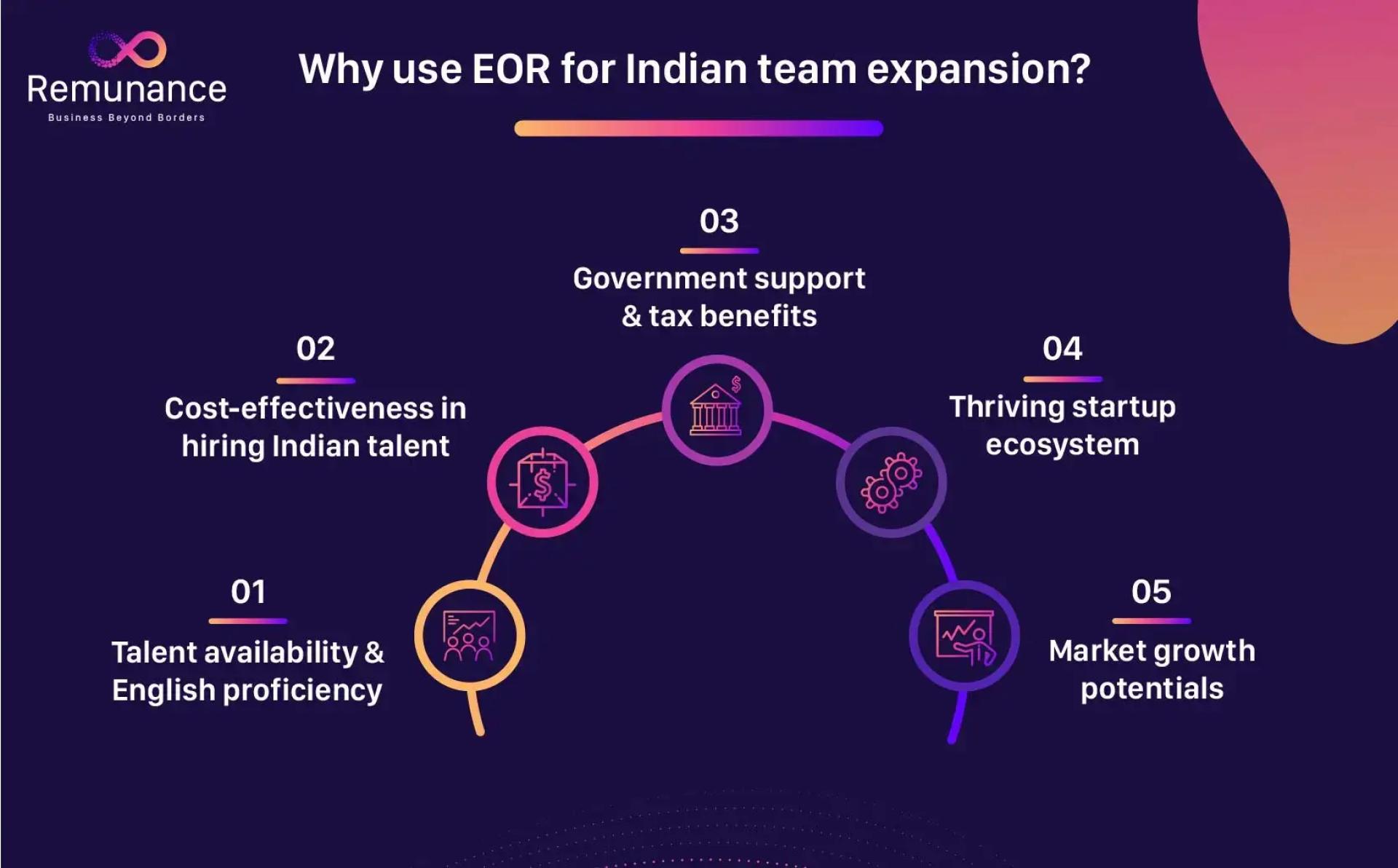
Talent Availability & English Proficiency
The abundant availability of a large English-speaking population and skilled talent is one of the primary reasons global companies prefer to expand their business operations in India. Each year, India produces a large pool of highly educated professionals who graduate from top Indian universities. Their skills can be used in various industries, including information technology, engineering, design, medicine, and finance. Through EOR, you can take advantage of building remote teams in India by hiring top talent smoothly and employing them compliantly.
Cost-Effectiveness in Hiring Indian Talent
One significant advantage of hiring Indian talent is its cost-effectiveness. Compared to the West, India offers a cost-effective workforce that allows SMEs to pursue Indian expansion with a limited budget. Working with an employer of record (EOR) partner, you are completely protected from compliance risks and hefty financial penalties in case of non-compliance with employment regulations. As compared to other employment models, EOR services are highly cost-saving options.
Government Support & Tax Benefits
Over the years, the Indian government has taken several initiatives to increase investment inflows from foreign countries and facilitate ease of doing business. On various occasions, India entered into multiple bilateral agreements with major global economies to boost cross-border business opportunities by reducing tariffs and providing tax incentives. In India, EOR services attract zero-rated goods and service tax (GST) as the service allows more employment opportunities for Indian talent in global companies.
Thriving Startup Ecosystem
India boasts a thriving startup ecosystem, characterized by the rising number of successful startup operations and a surge in entrepreneurial activities. Major Indian cities like Bengaluru, Mumbai, Delhi, Chennai, and Pune have become the hotspots for innovation and entrepreneurship, leading a path for a supportive ecosystem for startups. You can decide on any office location for your EOR employees and EOR service will provide IT and infrastructure support for your new office.
Market Growth Potentials
India’s impressive economic growth in the last decade has attracted the attention of foreign companies across the globe. With the increasing middle-class population and a vast consumer base, foreign companies can tap into this rapidly growing market and expand their customer base. Partnering with EOR services, a foreign business can easily learn about Indian cultural differences and work culture to ensure a successful business operation. EOR services also help you establish a legal entity in India when your team grows significantly in the Indian market.
Employer of Record (EOR) Pricing in India
You’ll find two types of employer of record pricing in India. Some service providers charge their fees based on the percentage (5-18%) of the aggregate monthly salary of employees. On the other hand, some employer of record service providers offer a fixed service fee ranging from USD 199-499 per employee monthly. The pricing variation is due to various reasons, such as the type of services availed, project complexities, etc.
Also, it’s crucial to understand the difference in the pricing factor between local EOR and multi-country EOR when determining the overall EOR service cost. To get a clear picture of the EOR pricing in India, you can learn the cost of building remote teams in India.
On average, the local EOR service charge in India for running a team of 6 EOR employees—a manager, two seniors, and three junior employees will be around USD 10,000 monthly. When running the same 6 EOR employees through multi-country EOR service providers, the service pricing of EOR in India will be around USD 13300 monthly. The estimated cost of employer of record (EOR) services mentioned above is the overall charge for a full range of services ranging from recruitment and compliance assistance to payroll and HR administration.
Why Remunance as Your Reliable EOR Partner in India?
Remunance was founded by Rajendra Vaidya in 2020. The company is one of the thought leaders and seasoned players in the Indian EOR industry. Being a local EOR company in India, it has displayed its strengths in establishing a formidable network to ease employment in the Indian market. The company has a fixed and transparent pricing structure for employer of record services, which ranges from USD 149-299 per employee monthly. Flexible contract terms and a unique approach to HR administrative support are key aspects that set it to stand out from competitors.
Being an ISO-certified company, Remunance is completely aware of various data protection regulations for our clients. The company ensures data security and personal data protection to comply with Indian compliance regulations and other regulations such as the General Data Protection Regulations (GDPR).
Specializing in compliance support, human resource (HR) services, payroll processing, etc, Remunance offers all-in-one solutions to ensure smooth team building and business operations. The company keeps abreast of the Indian laws and legal systems to ensure that client companies can continue their business operations in India without any compliance risks and legal liabilities.
At Remunance, we value transparency and trust when doing business with us. So, we focus on ethical business practices to ensure sustainable business growth. While we take full responsibility for handling the administrative functions of your Indian team, you can devote your time to increasing your business bottom line.


